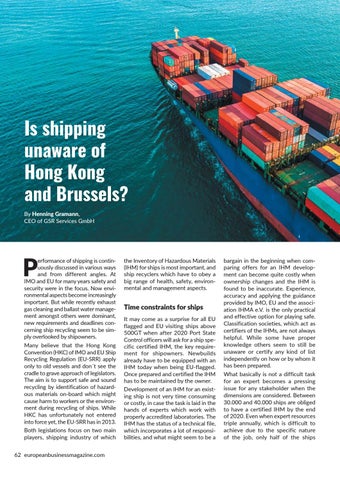Is shipping unaware of Hong Kong and Brussels? By Henning Gramann, CEO of GSR Services GmbH
P
erformance of shipping is continuously discussed in various ways and from different angles. At IMO and EU for many years safety and security were in the focus. Now environmental aspects become increasingly important. But while recently exhaust gas cleaning and ballast water management amongst others were dominant, new requirements and deadlines concerning ship recycling seem to be simply overlooked by shipowners.
Many believe that the Hong Kong Convention (HKC) of IMO and EU Ship Recycling Regulation (EU-SRR) apply only to old vessels and don´t see the cradle to grave approach of legislators. The aim is to support safe and sound recycling by identification of hazardous materials on-board which might cause harm to workers or the environment during recycling of ships. While HKC has unfortunately not entered into force yet, the EU-SRR has in 2013. Both legislations focus on two main players, shipping industry of which 62 europeanbusinessmagazine.com
the Inventory of Hazardous Materials (IHM) for ships is most important, and ship recyclers which have to obey a big range of health, safety, environmental and management aspects.
Time constraints for ships It may come as a surprise for all EU flagged and EU visiting ships above 500GT when after 2020 Port State Control officers will ask for a ship specific certified IHM, the key requirement for shipowners. Newbuilds already have to be equipped with an IHM today when being EU-flagged. Once prepared and certified the IHM has to be maintained by the owner. Development of an IHM for an existing ship is not very time consuming or costly, in case the task is laid in the hands of experts which work with properly accredited laboratories. The IHM has the status of a technical file, which incorporates a lot of responsibilities, and what might seem to be a
bargain in the beginning when comparing offers for an IHM development can become quite costly when ownership changes and the IHM is found to be inaccurate. Experience, accuracy and applying the guidance provided by IMO, EU and the association IHMA e.V. is the only practical and effective option for playing safe. Classification societies, which act as certifiers of the IHMs, are not always helpful. While some have proper knowledge others seem to still be unaware or certify any kind of list independently on how or by whom it has been prepared. What basically is not a difficult task for an expert becomes a pressing issue for any stakeholder when the dimensions are considered. Between 30.000 and 40.000 ships are obliged to have a certified IHM by the end of 2020. Even when expert resources triple annually, which is difficult to achieve due to the specific nature of the job, only half of the ships
